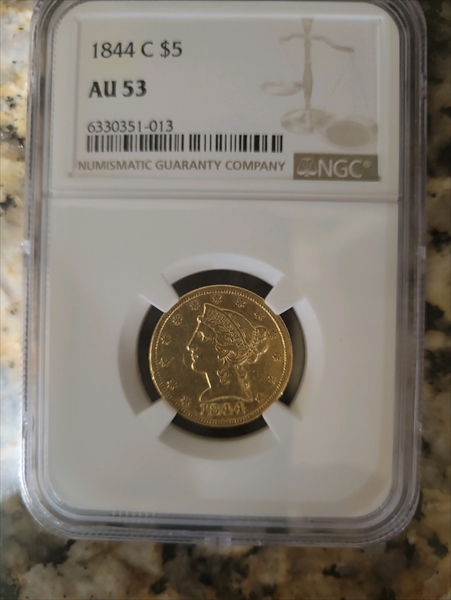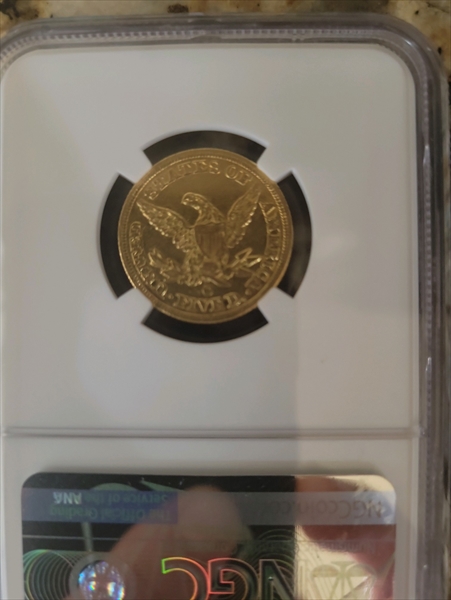1844-C $5 AU 53 PCGS号8220
专家评论
Doug Winter
The rarity of this issue is best explained by Anthony Stautzenberger in his article “Rarity of the Charlotte’s Half Eagles” (Numismatic Scrapbook, may 1974, pp. 404-408). According to Stautzenberger, by early 1844 the Bechtler mint had earned the unenviable reputation of producing underweight coins of questionable fineness. The public trusted that the Charlotte Mint coins were the most readily accepted medium of exchange in North Carolina and the surrounding area. This fact, coupled with a fire at the mint that halted production in 1845, caused the 1844-C half eagle to see very extensive circulation.The 1844-C is among the scarcest half eagles from this mint. When available, the typical piece is likely to grade Very Fine to Extremely Fine and to have poor overall eye appeal. Properly graded AU50 and AU53 examples are very scarce and AU55 to AU58 coins are quite rare. There are approximately a half dozen 1844-C half eagles known in Uncirculated, including four that grade MS63 or thereabouts by current standards.
STRIKE: This is an issue that is not often seen with a sharp strike. The obverse is always weaker than the reverse. The curls around the forehead are softly impressed and the hair on the top of the head and in the bun is weak as well. The stars are mostly sharp with many having full radial line definition. The numerals in the date often show a band of flatness across the middle, making the top appear sharper than the base. The reverse has some lightness on the eagle. This is most obvious on the wing tips, the upper portions of the legs and the left claw. The horizontal lines in the shield are sometimes weak and may appear indistinct.
SURFACES: Nearly every 1844-C half eagle that I have seen has very heavily abraded surfaces. This was an issue that saw extensive circulation and, as a result, most examples show clusters of deep, detracting abrasions in the fields. Many others have been cleaned and show resultant hairlines. This is an extremely hard issue to find with acceptable surfaces.
LUSTER: The typical 1844-C half eagle shows enough wear that it has little, if any, original luster remaining. On higher grade pieces, the luster is satiny with a somewhat grainy texture. The quality of the luster is not as pleasing as seen on some of the other Charlotte half eagles from the early 1840’s.
COLORATION: Original, uncleaned examples display a distinctive medium to deep green-gold hue. A few have also been seen with a lighter vivid yellow-gold shade. This is one of the rarest Charlotte half eagles with original color and locating an uncleaned, undipped example is especially difficult.
EYE APPEAL: While there are a few attractive higher grade pieces known, the typical 1844-C half eagle has decidedly below average eye appeal. This is the result of the combination of poor strikes, heavily abraded surfaces and evidence of harsh cleaning(s).
DIE CHARACTERISTICS: Some higher grade examples show die polish lines on the obverse next to the outline of the portrait.
DIE VARIETIES: One variety is known.
Variety 1 (formerly Variety 7-D): The 1 in the date is centered in the field between the bust and the denticles. The second 4 is also centered in the field between the bust and the denticles. The reverse was used only in 1844 and it is the first Charlotte half eagle reverse with large letters. The mintmark is large and its right edge is over the upright of the E in FIVE. The left edge of the mintmark is over the center of the V. The mintmark is positioned slightly closer to the feathers than to the V.
David Akers (1975/88)
The 1844-C is even more rare than the 1843-C and is just as rare as the C mint Half Eagles from 1839-1842, excepting of course the 1842-C Small date. When available, this date is usually in the VF to EF range. Specimens in AU or Unc are almost unobtainable and the best one I have seen was the coin that brought $4750 in Stack's Bareford Sale 912/78). This same coin had earlier appeared in the Lee Sale of 1947.PCGS #
8220
设计师
Christian Gobrecht
边缘
Reeded
直径
21.65 毫米
重量
8.36 克
铸币数量
23631
金属成分
90% Gold, 10% Copper
更高评级数量
25
评级较低的钱币数量
95
地区
The United States of America
价格指南
PCGS 数量报告
拍卖 - PCGS 评级的
拍卖 - NGC 评级的
稀有性和存量估计 了解更多
| 所有评级 | 400 |
| 60或以上 | 6 |
| 65或以上 | 0 |
| 所有评级 | R-6.2 |
| 60或以上 | R-9.7 |
| 65或以上 | R-10.1 |
| 所有评级 | 86 / 112 TIE |
| 60或以上 | 29 / 112 TIE |
| 65或以上 | 1 / 112 |
| 所有评级 | 123 / 218 TIE |
| 60或以上 | 54 / 218 TIE |
| 65或以上 | 1 / 218 |






















